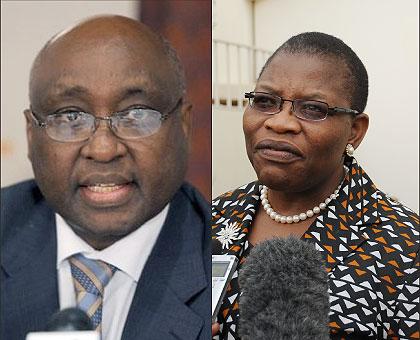Private sector development in Africa will top the agenda, this week, at a high-level meeting of international parliamentarians which gets underway, on Wednesday, in Kigali.


Private sector development in Africa will top the agenda, this week, at a high-level meeting of international parliamentarians which gets underway, on Wednesday, in Kigali.According to the Parliamentary Network on the World Bank and IMF(PNoWB/IMF) , the main objective of the three-day conference, bringing together between 150 to 200 participants, including MPs, business leaders and development partners, is to explore ways of promoting business friendly environment in Africa.They will also discuss how countries can improve their ranking in international evaluations, notably in the global Doing Business report.The Parliamentary Network says that through a knowledge and experience exchange among delegates, MPs will be better equipped to put in place the right legislation for private sector development.Key speakers will include President Paul Kagame; Kamal Alkheshen, Sector Operations Vice President, AfDB; Obiageli Ezekwesili, the WB Vice President for Africa; and Arnold Ekpe, the President of ECOBANK. Others include Alain Destexhe, MP, Chair of the Parliamentary Network; Roger Nord, Deputy Director, IMF’s Africa Department; and Aliko Dangote, CEO, DANGOTE Group.Wole Soyinka, a famous Nigerian poet, novelist, and Nobel Prize Laureate, will be a special guest speaker, and will discuss the issue of "Leadership for Development in Africa.”Eric Rutabana, the chief investment officer of Business Partners International Rwanda, an organisation that provides finance and technical assistance to local SMEs, is upbeat about the meeting"Since Rwanda has been doing well in terms of doing business, the conference should be an ideal forum to discuss more regulatory reforms that are required for further improvement in our ranking, by particularly promoting reforms that will make SMEs more robust, thus becoming true engines of private sector development,” he said in an interview yesterday.Over the recent years, Rwanda has been a notable leading global reformer in Doing Business.According to Doing Business Report 2011: Making a Difference for Entrepreneurs, the eighth in a series of annual reports published by IFC and the World Bank, Rwanda was among 10 most-improved economies.According to Rutabana, the conference represents yet another opportunity for the country to showcase the various investment opportunities, but added that the country’s impressive "ranking and improvements should translate into actual investments.”MP Henriette Sebera Mukamurangwa, a member of the Chamber of Deputies’ standing committee on economy and trade, is confident the country will learn a lesson or two from other participating countries."I have noticed that there will be a couple of highly distinguished presenters. Despite our improvements, Rwanda is not yet the best in terms of Doing Business. That means there are areas where we have got to put more effort, we will definitely learn from those who are ahead of us.”But Mukamurangwa also believes the guests, too, have a lot to learn from Rwanda.John Gara, the CEO of Rwanda Development Board (RDB), said parliaments, worldwide, are critical players in the creation of conducive environment for the private sector to thrive ."Our own parliament introduced or reformed numerous commercial laws that have, for example, contributed to our drastic improvement in Doing Business rankings. I am very pleased that the Parliamentary Network chose Rwanda as the venue for this conference, which is important for experience sharing,” Gara said."I think it is a vote of confidence in our Parliament, as well as, of course, our Executive and Judiciary... that, together, have created the friendly business environment in Rwanda.”According to a concept note from Parliament, the Parliamentary Network seeks to provide parliamentarians with more tools to introduce reforms in their respective countries. A field visit is also scheduled for a group of visiting lawmakers at the end of the conference.In months prior to the conference, the Secretariat of the Parliamentary Network reportedly asked MPs from ten African countries to give an assessment of the private sector environments in their countries. Their feedback will be used during the conference. "The aim of the conference is to produce a set of recommendations for participants to take back to their home countries, for parliamentary discussion and eventual implementation,” reads part of the concept note.After the conference, the Secretariat of the Parliamentary Network will track progress on the implementation of recommendations with a potential follow-up initiative, in March 2013, to take stock of progress and identify areas where implementation remains a challenge. The Kigali conference is supported by the African Development Bank, Belgium, the World Bank, the International Financial Corporation, and the International Monetary Fund.Founded in 2000, the Parliamentary Network provides a platform for parliamentarians from over 140 countries to advocate for increased accountability and transparency in international financial institutions and multilateral development financing.


